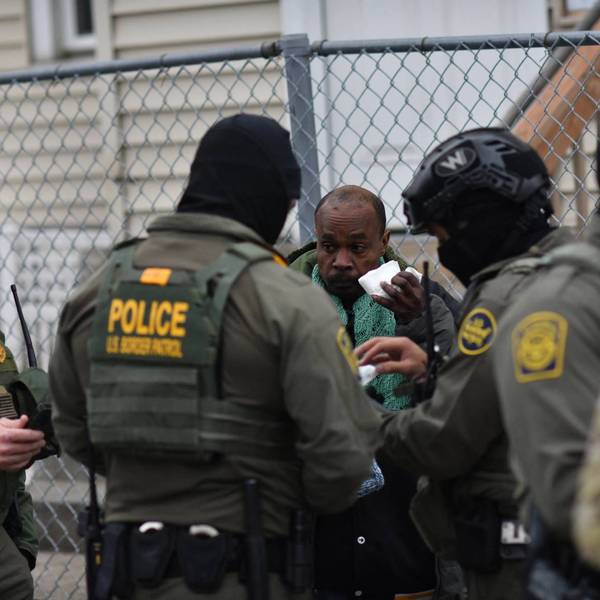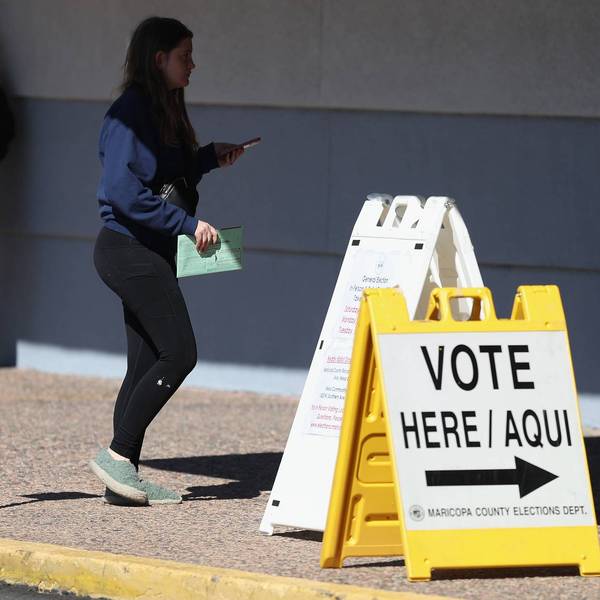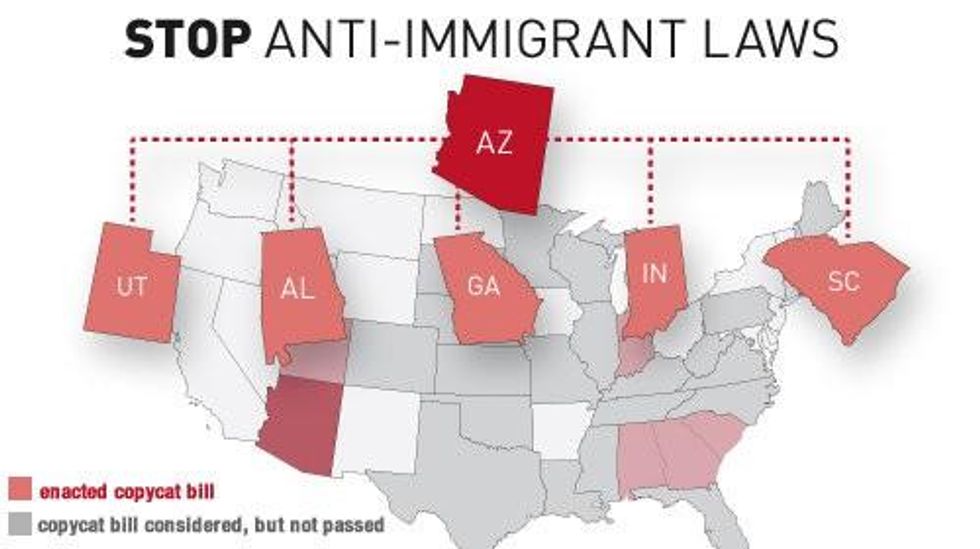S.B. 1070 is Arizona's controversial anti-immigrant law. The ACLU and the Department of Justice filed lawsuits challenging the law, charging that it is unconstitutional and encourages racial profiling. Five Arizona copycat laws passed in 2011, including Alabama, Utah, Georgia, South Carolina and Indiana. Federal courts have blocked major provisions of each state's law from going into effect, and in light of the humanitarian crises, economic costs and reputation harm these laws have brought, lawmakers across the country have begun to distance themselves from duplicating this model. On April 25, the Supreme Court will hear arguments on Arizona v. United States.
When the Supreme Court hears arguments on April 25 challenging Arizona's notorious anti-immigrant law, S.B. 1070, it will tackle the legal question of whether states can create a patchwork of separate immigration laws, beyond the control of the U.S. government.
But laws like S.B. 1070 pose even more fundamental questions for our nation. As Americans, will we tolerate discriminatory laws that encourage racial profiling? Or will we choose fairness and equality over discrimination and a police state that reaches into our personal lives?
We are used to saying that we live in a free country. But S.B. 1070 and its ilk threaten our cherished freedoms. Arizonans are not the only ones at risk. Alabama, Georgia, Indiana, South Carolina and Utah have passed similar laws. If the courts allow them to go forward, everyone in these states will always need to carry identity papers to guard against police intrusions.
The simple act of running out to the grocery store or picking up a child from school could turn into a roadside detention or even a trip to jail. As police chiefs like Birmingham's A.C. Roper and Salt Lake City's Chris Burbank have pointed out in criticizing such laws, the risk of such seizures is greater if you look or sound like a "foreigner." This is wrong and deeply troubling.
That is why the ACLU and other civil rights groups have challenged states' immigration laws. We represent people like Jim Shee, an American citizen of Chinese and Spanish descent and a lifelong Arizona resident. Shee was stopped twice by police and asked to show his "papers." He now carries his passport with him at all times in case he is again pulled over and required to prove his right to be in his own country and city.
We also represent Alicia Cervantes, a native Utahan and mother of four U.S.-born children. We have succeeded in getting a temporary order blocking Utah's anti-immigrant law. But if it goes into effect, Cervantes fears her daughter, who has spent her whole life in the Salt Lake City area, will be targeted by police because of the color of her skin.
In Georgia, we represent Paul Bridges, the mayor of the small town of Uvalda. He is among the many people there who won't hesitate to give neighbors a ride to church or the doctor without caring about their immigration status. But under Georgia's law, Bridges and the good people of Uvalda would be guilty of a felony.
The Supreme Court is unlikely to focus on the fears of these Americans and others like them when it considers the federal government's challenge to the Arizona law on April 25. It will focus instead on whether S.B. 1070 is preempted by federal law and whether our Constitution can tolerate a patchwork of state immigration regulations.
The answer to that question is important, but the court's decision will only be a part of the story. As Americans, we need to decide if we want to live up to our founders' vision of a free country, where people can go about their business without concern about police interference. We must decide if we want to live up to our national commitment to equality and civil rights.
The answers are already clear. Communities around the country are asking their lawmakers to focus on positive steps, rather than enacting laws that cause controversy, trigger lawsuits and dampen economic growth. Mississippi's legislators appear to have abandoned an effort to pass a discriminatory immigration bill. Even Alabama's leadership has introduced legislation that would scale back their disastrous anti-immigrant law, HB 56.
As a nation we have a choice. We can enact laws that encourage racial profiling and return us to our troubled past. Or we can choose a path that leads us forward: our state legislators can join police chiefs, business and faith leaders who reject these discriminatory laws and are standing up for our right as Americans to live in a free society.




